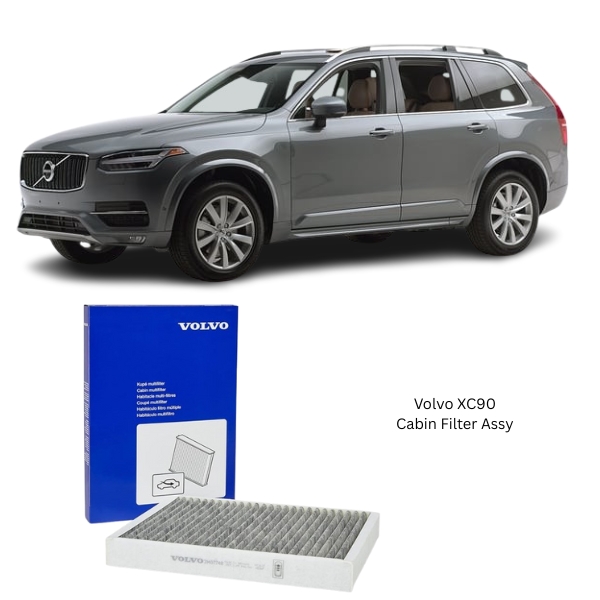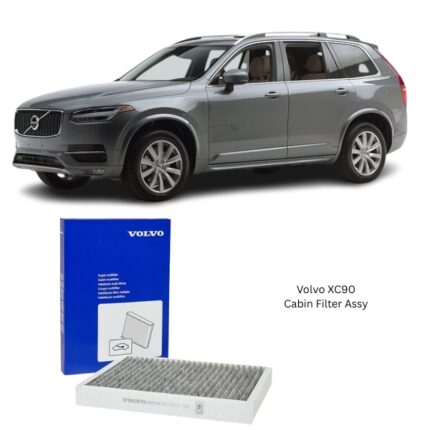Get Volvo XC90 Cabin Filter Assy 31407748 in Kenya
The Cabin Filter Assembly is a key component of a vehicle’s heating, ventilation, and air conditioning (HVAC) system, responsible for purifying the air that enters the passenger compartment. By trapping dust, pollen, debris, smoke, and other airborne contaminants, it ensures that the occupants breathe clean and fresh air, improving both comfort and health during travel.
Purpose and Function
The main role of the cabin filter assembly is to filter the air entering the cabin through the HVAC system, whether it comes from outside or is recirculated. This filtration process is essential for:
-
Removing airborne particles such as dust, dirt, pollen, and soot.
-
Reducing allergens, helping passengers with respiratory conditions or sensitivities.
-
Capturing fine pollutants including smoke, exhaust gases, and industrial emissions.
-
Maintaining HVAC performance by preventing debris from clogging the evaporator and ducting.
-
Enhancing passenger comfort by reducing odors and keeping air fresh.
Without it, unfiltered air could circulate freely inside the cabin, leading to poor air quality and potential discomfort for passengers.
Design and Construction
A cabin filter assembly typically consists of:
-
Filter Media:
-
Made from pleated paper, synthetic fibers, or a combination of both.
-
Designed to trap particles of various sizes without restricting airflow.
-
Often arranged in multiple layers for improved efficiency.
-
-
Activated Carbon Layer (Optional):
-
Found in advanced filters, this layer absorbs odors and harmful gases like nitrogen oxides and ozone.
-
Helps neutralize unpleasant smells from traffic pollution, fuel vapors, and environmental sources.
-
-
Pleated Structure:
-
Maximizes surface area for higher contaminant retention capacity.
-
Maintains steady airflow through the HVAC system.
-
-
Frame:
-
Made from rigid plastic or treated cardboard to hold the filter media in place.
-
Provides a secure fit to prevent air bypass.
-
Types of Cabin Filter Assemblies
Cabin filters come in various designs to suit different filtration needs:
-
Particulate Cabin Filter:
-
Basic design that traps dust, pollen, and other solid particles.
-
Ideal for general conditions and everyday driving.
-
-
Activated Carbon Cabin Filter:
-
Combines particulate filtration with odor and gas absorption.
-
Provides better cabin air freshness, especially in urban traffic.
-
-
Electrostatic Cabin Filter:
-
Uses an electrostatic charge to capture even smaller particles such as smoke or bacteria.
-
Offers enhanced filtration performance.
-
-
Multi-Layer Combination Filters:
-
Integrates different media layers for comprehensive protection.
-
Can trap particles, absorb odors, and neutralize harmful gases simultaneously.
-
Operation in the HVAC System
When the HVAC system draws air—whether from outside or in recirculation mode—the air passes through the cabin filter assembly before it enters the ducts. The filter traps contaminants while allowing clean air to flow into the passenger area. This process:
-
Maintains optimal air quality inside the cabin.
-
Protects internal HVAC components from dust and debris.
-
Prevents mold and odor buildup within the ventilation system.
Benefits of a Well-Maintained Cabin Filter Assembly
-
Cleaner Air Quality:
Reduces exposure to dust, pollen, and harmful airborne particles. -
Improved Health:
Lowers the risk of allergy flare-ups, respiratory irritation, and other air-related discomforts. -
Odor Control:
Activated carbon models neutralize unpleasant smells from outside. -
HVAC Protection:
Prevents blockages in the evaporator and ducts, extending the life of the system. -
Consistent Performance:
Maintains smooth airflow and proper climate control operation.
Signs of a Dirty or Failing Cabin Filter
A cabin filter becomes less effective over time as it accumulates dirt and debris. Signs that it may need replacement include:
-
Reduced airflow from the vents, even when the fan is on high.
-
Musty or unpleasant odors inside the cabin.
-
Increased dust settling on dashboard and interior surfaces.
-
Persistent sneezing or allergy symptoms while driving.
-
Noisy HVAC operation due to airflow restriction.
Maintenance and Replacement Intervals
Most cabin filter assemblies require replacement every 12,000 to 20,000 kilometers or at least once a year. However, this interval may shorten in certain conditions:
-
Dusty or sandy environments: Filters clog faster and may need replacement every 6 months.
-
Urban traffic areas: Higher exposure to exhaust fumes and pollutants.
-
High pollen seasons: Replacement before and after the season can improve comfort.
Replacement is usually straightforward, with the filter accessed through the glove compartment, dashboard panel, or under the hood. The correct airflow direction must be followed during installation.
Consequences of Neglect
Ignoring cabin filter maintenance can cause:
-
Reduced HVAC performance due to restricted airflow.
-
Unpleasant odors from trapped moisture and organic matter.
-
Health concerns due to higher exposure to pollutants and allergens.
-
Increased strain on the blower motor, potentially leading to premature failure.
Environmental and Operational Challenges
Cabin filters face constant exposure to:
-
High particle loads from road dust, plant matter, and construction zones.
-
Polluted urban air with harmful gases and fine particulate matter.
-
Moisture and condensation which can promote mold growth.
-
Temperature fluctuations from hot summers to cold winters.
Technological Advancements
Modern cabin filters benefit from innovations such as:
-
Nano-fiber filtration: Captures ultra-fine particles including bacteria and some viruses.
-
Advanced activated carbon formulas: Improved odor absorption and gas neutralization.
-
Antimicrobial coatings: Inhibit microbial growth for longer-lasting freshness.
-
Eco-friendly materials: Recyclable and biodegradable filter media reduce environmental impact.
Best Practices for Performance
-
Inspect during every service: Regular checks help prevent performance loss.
-
Replace proactively: Don’t wait until airflow drops significantly.
-
Keep the filter housing clean: Remove debris before installing a new filter.
-
Follow seasonal schedules: Change before high pollen or dust seasons for maximum benefit.
Follow us on Facebook for More Parts.





Reviews
Clear filtersThere are no reviews yet.